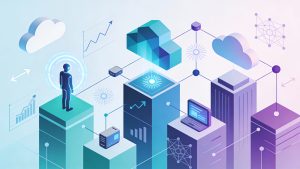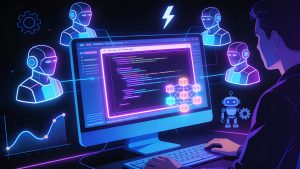OpenAI’s journey toward creating advanced artificial intelligence is centered on one clear ambition: building AI agents that can perform tasks just like humans. What began as experiments in mathematical reasoning has become an industry-leading push toward truly general-purpose AI systems capable of handling complex digital workflows.
From Math Problems to Reasoning Models
In 2022, researchers at OpenAI were focused on improving AI’s capacity for logical reasoning. Early work in mathematical problem-solving paved the way for breakthroughs that extended far beyond mathematics. These advances culminated in high-performing reasoning models, which have since won international academic competitions.
The real significance lies in how these models are evolving. OpenAI believes that enhanced reasoning skills will serve as the backbone for agents that can manage tasks on computers with a human-like approach — organizing, planning, and problem-solving across multiple domains.
The Rise of AI Reasoning Models
One of the pivotal moments came in 2024 with the introduction of OpenAI’s o1 reasoning model. This new class of AI was designed to go beyond text generation, using advanced techniques to plan, verify steps, and detect its own mistakes. Less than a year later, researchers behind this innovation became some of the most sought-after professionals in Silicon Valley, sparking intense recruitment competition across leading tech companies.
At its core, o1 showcased how combining reinforcement learning, large language models, and new computation techniques could elevate AI from surface-level answers to deeper, structured reasoning. This opened the door to agents capable of handling complex multi-step tasks.
Reinforcement Learning: The Breakthrough Enabler
Reinforcement learning has been key in the rise of these systems. Used since the early days of machine learning, it gained prominence when Google’s AlphaGo defeated a world champion in the game of Go. OpenAI researchers saw its potential to develop agents capable of simulating decision-making in real environments.
By 2018, OpenAI had developed its landmark GPT series, excelling at text generation but still struggling in logical areas like math. It wasn’t until 2023, with the breakthrough project known as “Strawberry,” that OpenAI fused reinforcement learning, additional computation time, and planning abilities to vastly increase reasoning performance. Researchers described this as the first time they witnessed AI “thinking aloud,” detecting mistakes, and retracing steps much like a human student solving a problem.
Scaling Up Reasoning
The advantage of reasoning models is their ability to use additional computation during problem-solving. Instead of producing quick outputs, these systems can spend more time on complex tasks, verifying answers through parallel reasoning paths. OpenAI has since scaled this approach, creating new agents that test multiple solutions simultaneously before choosing the best one.
Industry experts consider these scaling methods vital as traditional training approaches show diminishing returns. Reasoning models could represent the next frontier in artificial intelligence progress.
Are AI Models Really Reasoning?
The debate continues on what counts as “reasoning” in artificial intelligence. Some researchers argue that AI is merely running elaborate computations, while others believe the outputs mimic true reasoning. Whether semantic or philosophical, the outcome is practical: these models can analyze, plan, and correct themselves across a growing range of tasks.
Observers often compare this to airplanes and bird flight: while planes don’t flap wings like birds, their mechanical flight achieves similar results. By the same logic, AI reasoning models don’t replicate the human brain but achieve reasoning-like results that make them powerful and useful tools.
Beyond Coding: Toward General-Purpose Agents
Initial applications of AI agents have seen remarkable adoption in coding. Tools such as Codex and AI-powered development assistants are already reshaping software engineering workflows. However, the ultimate vision lies far beyond technical domains.
Researchers at OpenAI and elsewhere aim to build agents capable of handling day-to-day tasks, from browsing the internet and making purchases to planning schedules and solving subjective problems. Achieving this requires new data strategies and reinforced training techniques so that models can adapt to less structured, more ambiguous challenges.
Competition and Collaboration in the AI Race
The push for reasoning models has triggered fierce competition among the world’s top AI labs. Companies like Meta, Google, and xAI are racing to secure talent and build equally advanced agents. Several have introduced state-of-the-art reasoning models that test multiple ideas in parallel, improving their robustness and flexibility.
For OpenAI, this research is expected to play a major role in its upcoming releases, including GPT-5, which aims to consolidate its leadership in general-purpose AI. Alongside performance, the company is also prioritizing accessibility — creating agents that intuitively understand user needs without requiring detailed instructions.
A Glimpse Into the Future
OpenAI’s roadmap envisions AI agents that can take on virtually any computer-based task with minimal instruction. In practice, this means users could eventually interact with an AI system that books travel, drafts emails, manages finances, or troubleshoots software, all with a single prompt.
While today’s agents are still limited and prone to errors, rapid advancements suggest that this vision is not far off. Research is focused on reducing hallucinations, improving accuracy, and increasing adaptability. The long-term outcome could be agents that seamlessly integrate into everyday life, reshaping interactions with technology as profoundly as the internet or smartphones once did.
Conclusion
OpenAI’s pursuit of reasoning models and AI agents represents a defining moment for artificial intelligence. By prioritizing reasoning abilities and scaling mechanisms, the company is moving closer to building systems that can think, plan, and act with human-like flexibility.
The idea of an AI agent capable of “doing anything for you” is shifting from an imagined future to an approaching reality. While much work remains ahead, OpenAI’s progress signals a transformative era — one in which AI will not simply assist with isolated tasks but operate as a powerful partner in everyday problem-solving and creativity.
Read more such articles from our Newsletter here.



